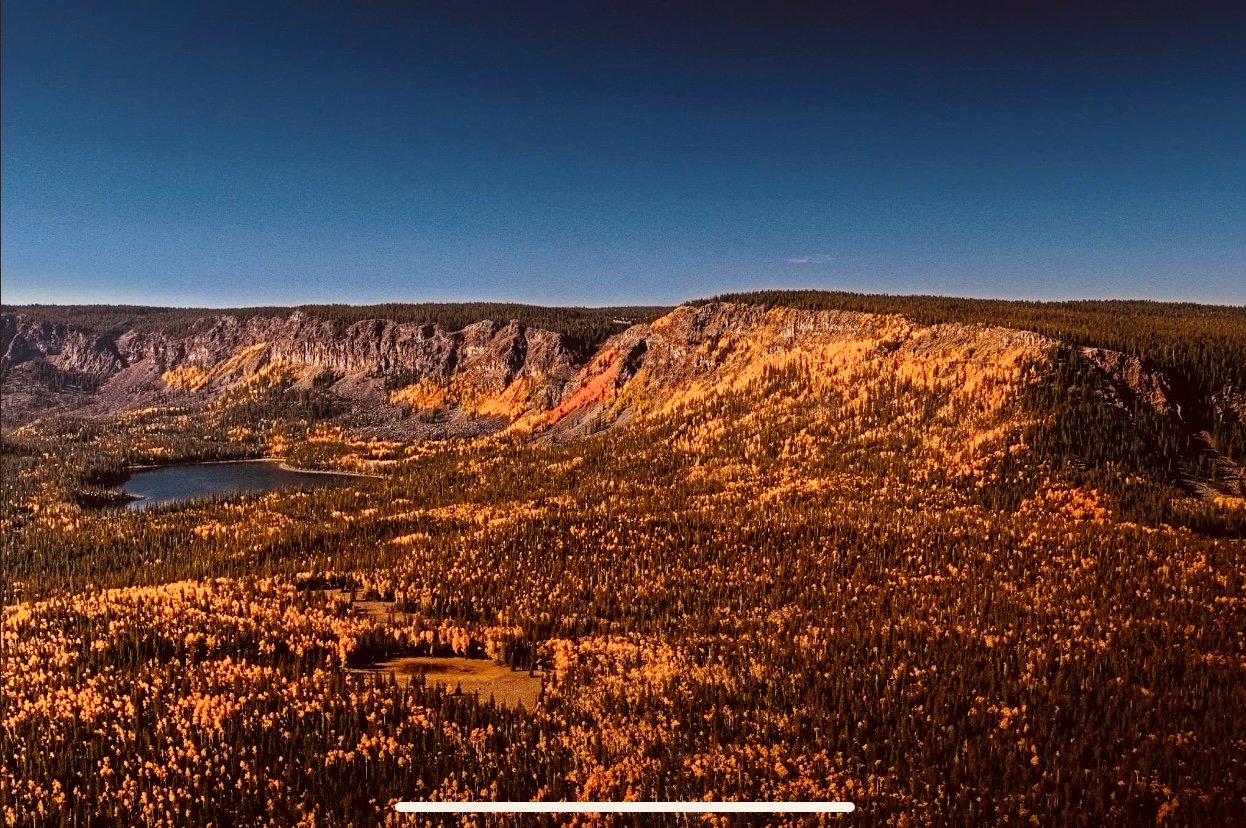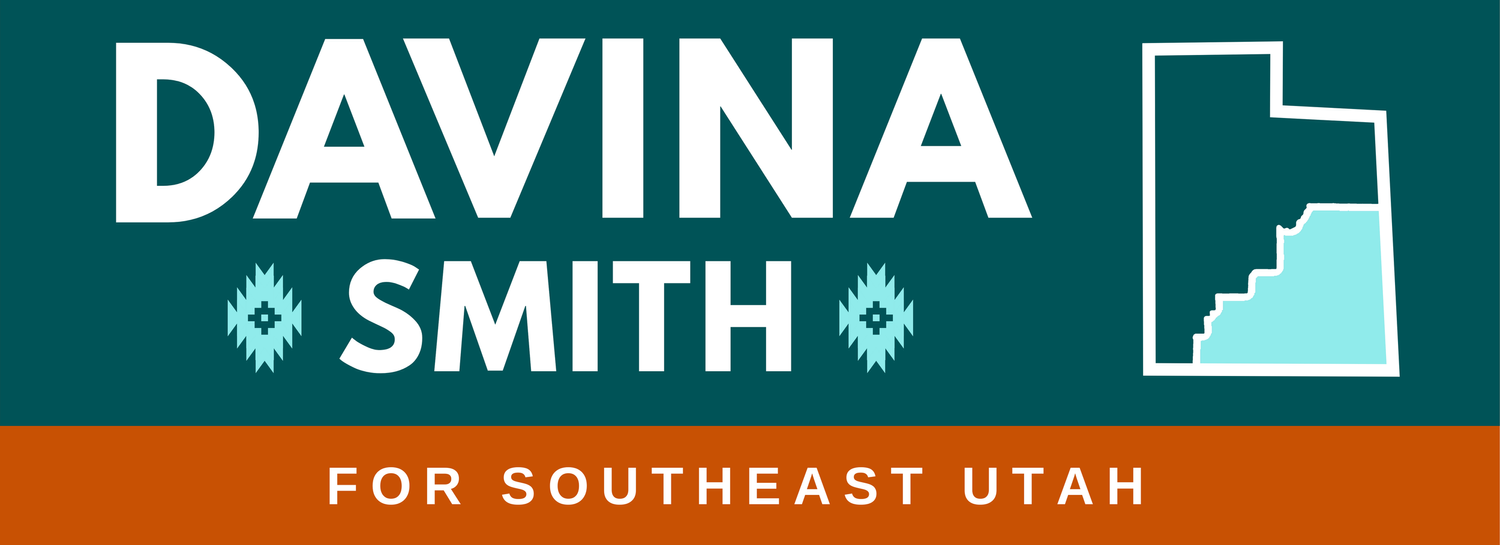
Davina’s Story
My name is Davina Smith and I’m running for Utah House of Representatives in District #69. We need someone to stand up for our rural and indigenous communities in Salt Lake City.
I’m originally from Monument Valley, Utah and am an enrolled member of the Diné (Navajo) tribe. I belong to the Ta'chii' nii (Red Running into the Water) clan and am born to the Ta' baa ha' (Edgewater) clan.
Growing up, my grandmother told me to go out in the world and learn as much as I could so I could someday come home and make things better for our community. When I was raising my four kids, I also told them to follow their passions and seek their own opportunities. I hope that one day they want to return to our native land, but I can’t ignore the fact that rural Utah is losing our best, our brightest, and most promising children. Now is the time for us to step up and make it possible for everyone to prosper here, with fair wages, good jobs, a high-quality education, and a healthy environment.
In the late 70s my Grandmother, Katherine Smith, defended her land on Big Mountain with a .22 caliber rifle. Amidst government enforced relocation of thousands of Diné people in the Navajo-Hopi Land Settlement Act of 1974, she fought for her freedom. She shot a rifle overhead when BIA agents came to her home, to defend her homestead and her freedom.
I remember being worried about the future of her home on Black Mesa. Where would our sheep, horses, donkeys, cats, and dogs go? What would happen to the spring planting and the fall harvest? What about the family get togethers, and the midnight Navajo poker where my aunt would come down the road with her bag of bubble gum and I would bring the penny collections I saved for my dad so when he won I could collect the winnings. Would my cousins and I ever be able to play again in our open playground of Big Mountain? I cherished the times where it rained and my Nali would tell us stories, and it felt like nothing else mattered. I was scared to lose these moments.
Until her last breath, she continued to fight, resist, and stand up for her home. My Grandmother showed me the power of using her voice.
I understand that it’s difficult to believe in politics when gas prices and grocery store receipts are rising. When it’s harder and harder to find affordable housing, or a job with a living wage. When rural communities aren’t able to access health care and water is scarce. I want kids in our district to see a future for their kids here. But I’m still hopeful. Our neighbors in rural Utah are kind and hardworking. Our home is worth fighting for.

“Until her last breath, she continued to fight, resist, and stand up for her home. My Grandmother showed me the power of using her voice.”
My Grandfather worked in the uranium mines when my mother was a child. She remembers my Grandmother washing the toxic yellow dust out of his clothes in the kitchen while she was cooking dinner. I attended pre-school in Halchita near the uranium tailings and I experienced chronic headaches throughout my childhood but never understood why. It turned out that our well water was contaminated and that exposure to radiation had caused my headaches. I’ve seen the negative impacts of the extractive industries but I also deeply understand how these industries put food on the tables for working families. My father was a United Mine Workers Union President at the Black Mesa Coal Pipeline in the 1980s. We must protect workers and the environment to preserve rural Utah for future generations.
I grew up attending a Native American Boarding School in Arizona, where we were reprimanded for speaking our native language and looked down upon for being indigenous. I started to share my stories and those of my indigenous neighbors through documentary filmmaking. This pursuit stemmed from a deep desire to bring awareness to the tribes that are still living here in Utah and who are often overlooked, invisible, and forgotten.
From there, I went into health care and education to understand how these institutions can be improved in our state. I brought tribes, ranchers, government officials, and recreationists to the table in discussions about the future of Bears Ears and Grand Staircase Escalante National Monument. I worked for the school district to support teacher training programs for underrepresented students. Over time, I've learned how to lead by listening first and encouraging mutual understanding through storytelling.
In 2019, I ran 360 miles from Bears Ears to the Salt Lake Capitol to bring awareness to the issues we face in Southern Utah. I didn’t realize then, but it was the start of something longer, a run that will not end until I’m a State Rep. I’m here because we deserve a representative who values respect, accountability, and unity. Someone who will truly listen.
For years I’ve been running. I’ve been running to uplift the voices of those around me, running to sustain my body and mind, running to nurture the community I love. Now I’m running for the Utah State House of Representatives in District 69 to carry your voices to the capitol. I love this community - let’s fight for a better future for rural Utah, together.
WORK BACKGROUND:
I began my work in education as the Assistant Manager, then eventually the Director, of the Indian Teacher Training program at the University of Utah. At the same time, I was putting myself through school studying sociology and interning with KUED. I dove into documentary filmmaking and shared stories about domestic violence, Indian boarding schools, and the history of Navajo relocation. As the American Indian Coordinator for the school district, I wrote grants and developed counseling programs and educational opportunities for students of color. I also wanted to have a deeper understanding of the healthcare system, so I joined Fourth Street Clinic as the Eligibility Specialist. I helped our homeless populations acquire disability medical services and worked to expand medicaid. I became vocal about issues in rural Utah and started to work in public policy. I worked for two nonprofits, Diné Bikeyah and Restoring Ancestral Winds, to advocate for land protection and to support domestic violence survivors and our Murdered and Missing Indigenous Relatives.
In my current position as a consultant for the National Parks Conservation Association, I assist in creating coalitions between tribes, rural stakeholders, governmental agencies, and politicians to ensure all voices are heard in public land discussions. All my work has been focused on bringing voices to the table who are left out, and advocating for more resources to communities who need them.
In my next campaign to become a Utah lawmaker, I hope to further connect these factors which determine the mental & physical health, longevity, and happiness for all our citizens.


